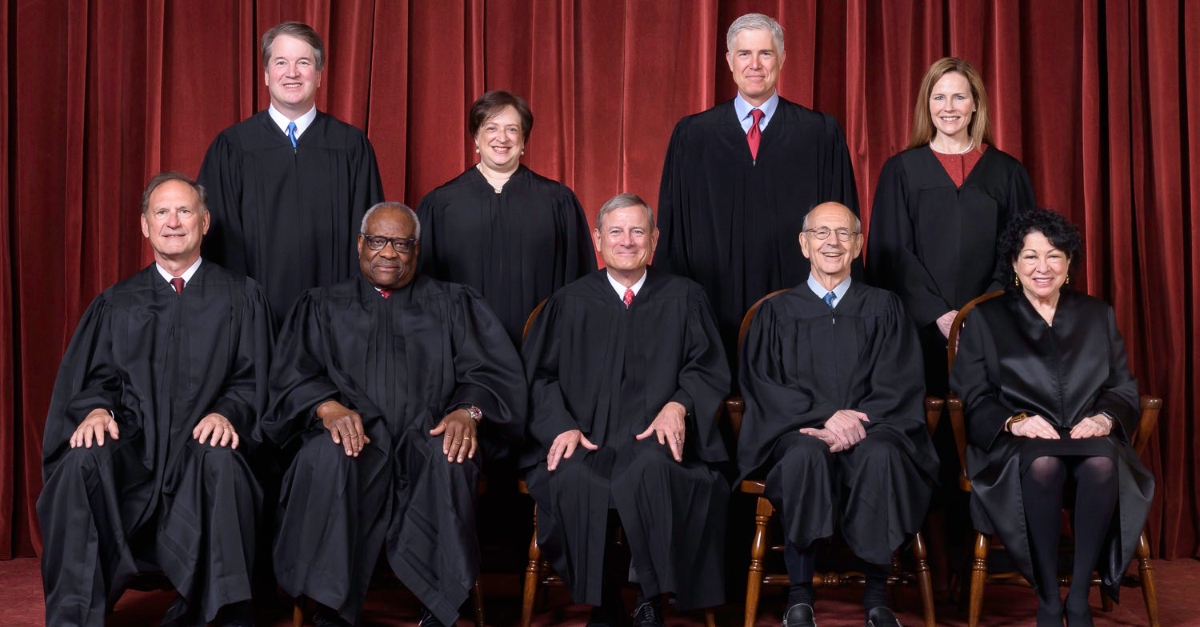
The Roberts Court, April 23, 2021; Seated from left to right: Justices Samuel A. Alito, Jr. and Clarence Thomas, Chief Justice John G. Roberts, Jr., and Justices Stephen G. Breyer and Sonia Sotomayor; Standing from left to right: Justices Brett M. Kavanaugh, Elena Kagan, Neil M. Gorsuch, and Amy Coney Barrett.
Just less than a week after a man in the midst of a self-described mental health crisis allegedly threatened to murder Justice Brett Kavanaugh, the U.S. House of Representatives overwhelmingly voted to beef up the security of Supreme Court justices’ families.
The bill passed by a margin of 396-27 in the House.
When initially brought forward by Senators John Cornyn (R-Texas) and Chris Coons (D-Dela.) more than a month ago, it passed by unanimous consent but reportedly stagnated. Then, momentum from the protests outside Supreme Court justices’ homes following the leak of a draft opinion in a pending case that would overturn Roe v. Wade. The legislation, which will go to President Joe Biden’s desk for his signature, provides for 24-hour protection for Supreme Court justices’ immediate families.
Cornyn and Coons say that the law would provide the type of security that’s in line with what certain executive and legislative branch members currently receive. All of the nay votes are reportedly Democrats, but some Democrats blamed Republicans for a delay on the bill’s passage. Republicans opposed another version of the bill that would also have protected the families’ of Supreme Court employees, beyond the justices.
The passage of the bill came quickly after a California man was charged in connection with a threat on Kavanaugh’s life.
On June 8, an armed man approached Kavanaugh’s home at around 1:50 a.m., carrying a pistol and a cache of other weapons in his backpack.
Authorities later identified the man as 26-year-old Nicholas John Roske of Simi Valley, California, who has been charged with attempting or threatening to murder the justice. Roske could be heard in a 911 call telling the dispatcher: “I need psychiatric help,” while en route to his alleged target.
Initial reports suggested that Roske was upset with the leaked draft opinion that would overturn Roe v. Wade and harbored other grievances about the Uvalde massacre and Supreme Court opinions expanding the wide availability of weapons in the United States. Recordings of his emergency call showed him speaking of apparent mental illness, saying he’d been “hospitalized multiple times.”
Disclosing that he’d been having “thoughts,” Roske told the dispatcher: “I’ve been having them for a long time. I’m from California. I came over here to act on them.”
In addition to informing 911, Roske also reportedly texted his sister after getting out of a taxi near Kavanaugh’s home in Chevy Chase, Md. Montgomery County Police Chief Marcus Jones said the emergency call may not have happened if not for the sister’s encouragement.
“This is when he texted his sister and told her of his intentions, and she convinced him to call 911, which he did,” Jones said, according to the Washington Post.
Roske’s diagnosis was not apparent on the phone call.
(Photograph by Fred Schilling, Collection of the Supreme Court of the United States)